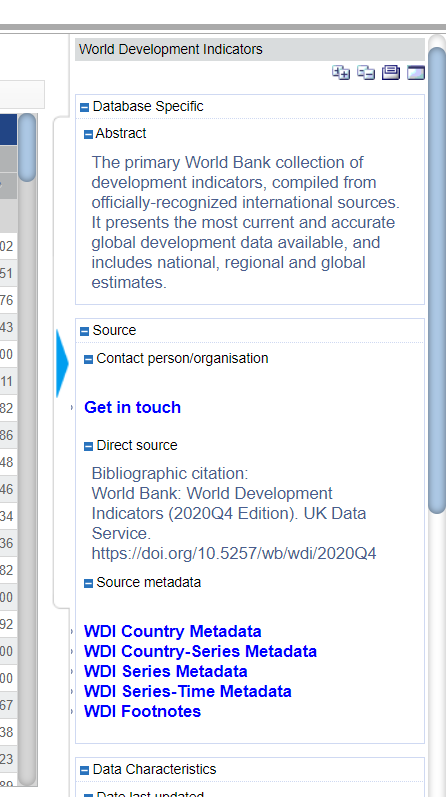 Finn Dymond-Green investigates how international macrodata in the UK Data Service collection is supporting research in the area of climate change.
Finn Dymond-Green investigates how international macrodata in the UK Data Service collection is supporting research in the area of climate change.
At the UK Data Service, we’re excited that we are able to provide access to some fantastic open international data from different data producers such as the World Bank, the United Nations, the International Monetary Fund and the OECD.
As COP26 approaches, and our minds are increasingly drawn to discussions of climate change and what humans can do to slow our contribution to it, we’re also pleased that we can offer access to the rich seams of International Energy Agency data to researchers and students in higher and further education.
Exploring data-enhanced climate change research
It felt timely to explore where the data we hold is being used in recent climate change research.
To do so, we ran a search based on citations of the data coupled with common related terms such as ‘climate change’ and ‘global warming’. Our first search revealed some interesting examples of where researchers had correctly cited the data they used. We continued our searches to attempt to draw out other examples of uses of the international data the UK Data Service provides access to, even where not (or only partially) cited.
The UK Data Service often reminds researchers of the importance of citing data they use.
It’s a helpful way for us to track the reach and impact of the data in our collection, as well as being as important as citing a paper or book. Dr Victoria Moody, deputy director and Co-I of the UK Data Service, wrote last year on the Data Impact blog about how the persistent identifiers we use (DOIs) and citing them can help us understand, measure and promote the impact of data we provide access to.
Citation information for each dataset on our international macrodata platform is available on the right-hand panel on the screen (sometimes hidden behind a large arrow).
In the UK Data Service catalogue, there’s also an easy-to-use tool to convert this citation into APA, DataCite, Harvard and Vancouver formats. For a quick overview, see our top ten tips to citing data.

Image: Example of citation panel on UK Data Service international data platform.
Three of the pieces of research we discovered (all by Pappas et al, from the Tyndall Centre for Climate Change Research) revealed the interesting uses of our data to explore climate change in an international context, given that they all explore climate change-related effects of industrial changes in China, India and South East Asia.
- Industrial Relocation and CO2 Emission Intensity: Focus on the Potential Cross-Country Shift from China to India and SE Asia
- Energy and carbon intensity: A study on the cross-country industrial shift from China to India and SE Asia
- Energy and Industrial Growth in India: The Next Emissions Superpower?
These three pieces of research were also notable for drawing on multiple IEA datasets, plus data from the World Bank and UNIDO.
| IEA | CO2 Emissions from Fuel Combustion: Highlights. 2015.
Energy Statistics of Non-OECD Countries. Conversion Factors 1971-2013. O2 Emissions From Fuel Combustion: Highlights. 2015. |
| World Bank | World Development Indicators. |
| United Nations Industrial Development Organization (UNIDO) | INDSTAT2 Industrial Statistics Database |
IEA data
In addition to some of the research mentioned above, the IEA’s World Energy Balances data have been used in some interesting research related to climate change.
Different pieces of research used the data to explore issues around energy consumption and emissions related to industrial production, transport and use of goods.
One by Doukas et al from the National Technical University of Athens and Imperial College London, assessed changes needed to make container shipping less emissions-heavy. Another by Meng et al, from University College London, the Norwegian University of Science and Technology and the Chinese Academy of Sciences, investigated energy consumption during different stages of production across sectors and across nations. A further piece of research by Oswald, Owen and Steinberger, from the Sustainability Research Institute at the University of Leeds, examined how income groups and consumption categories affect energy footprints internationally (open access PDF).
Research by Gregor Semieiuk addressed an existing hypothesis that faster growth is greener. In concluding that this is not the case, the author suggests that there is
“[…] important new information for calibrating integrated assessment models, many of which make a green growth assumption in near term projections.”
(Semieniuk 2018: page 1)
Potentially, this data-enhanced research will challenge assumptions in this area of research and knowledge, an action which contributes to the impact of data in our collection.
Fuel types
The IEA data also includes breakdowns on different energy use, including electricity, oil, coal, natural gas and renewables.
One example of research we discovered (Lee et al in an international collaboration across eleven universities) used IEA oil information to investigate the effects of air travel on climate change (open access PDF), modelling changes past, present and future. The paper includes a useful and informative graphical abstract illustrating their research.
World Bank data
The World Bank World Development Indicators have also proven useful to researchers in the field of climate change research. Research we uncovered again shows the international reach of the data we make available.
Two of the pieces of research explore issues related to Nigeria – the financial costs and benefits of gas development projects there (Adamu and Darma from the universities of Nigeria and Liverpool), and the effect on Nigerian gas and oil exports of transitioning to renewable energy consumption (Waziri et al from the University of Maiduguri and Abertay University – open access PDF).
A third piece of research by Muhumuza et al, from the Centre for Sustainable Technologies at Ulster University, investigated energy consumption levels and technical approaches for supporting development of alternative energy technologies for rural sectors of developing countries.
Keeping the data up to date
We work hard to ensure data is available to researchers in as timely a manner as possible. In recent months, we have processed, ingested and published the latest versions of the following data which may be of use to researchers investigating issues around climate change.
- IEA Coal information
- IEA Electricity information
- IEA Energy Efficiency Indicators
- IEA Energy Prices and Taxes
- IEA Greenhouse Gas Emissions from Energy
- IEA Natural Gas information
- IEA Oil information
- IEA Renewables information
- IEA World Energy Statistics
- OECD Environment Statistics
The UK Data Service makes a great deal of other international data available, including other environment-related datasets, via our .stat platform.
About the author
Finn Dymond-Green is the Service Director for Impact for the UK Data Service. Follow the impact team on Twitter: @UKDSImpact
Featured image by Chris LeBoutillier on Unsplash
